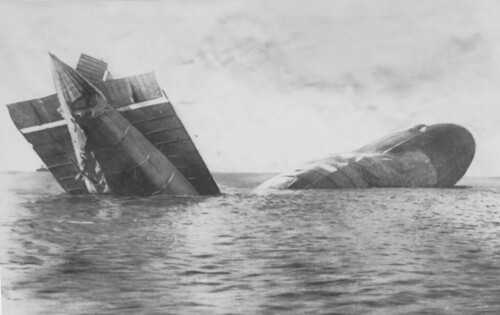
Zeppelin L 15 in the Thames, 1916.
A hundred years ago tonight, the night of October 13/14, 1915, was the deadliest German air raid on Britain of the First World War. In what became known as the “Theatreland Raid,” five German Navy Zeppelins arrived over the Norfolk coast at about 6:30 PM. Unbeknownst to the Germans, new ground defenses had been put in place, but the British guns proved ineffective. One of the guns, near Broxbourne, was put out of action by bombs dropped from Zeppein L 15. The airship continued to London and began bombing over Charing Cross. The first bombs struck the Lyceum Theatre, killing 17. Additional bombs were dropped on Holborn. As it approached Moorgate, it encountered a new 75 millimeter gun. Recognizing the threat, the airship quickly jettisoned ballast and dropped only three more bombs before fleeing.
In total, the five German airships killed 71 and injured 128 that night. Among those killed were three brothers, ages 10, 14, and 15. Roy, Brien, and Gorden Currie were sleeping when a bomb fell on their building.
When the fire brigade reached the boys’ room, Brien, the youngest, was already dead. Roy, the middle boy, was dead on arrival at the hospital. Gorden, the eldest, was severely wounded with wounds to the back, chest, hip, and thigh. A piece of shrapnel was in his body. He died of his wounds two days later.
At the coroner’s inquest, the Currie family’s housekeeper gave this account of the deadly attack:
I was fast asleep when I heard an awful explosion which awoke me. I seemed to spring from the top of the bed to the bottom. Then I groped my way to the door which I found was on the floor. I stayed there because the side wall had fallen in on the stairs and landing. I called out to the father asking if he was all right. He replied, “I’m all right, but I can’t move.” Then next I called for the boys, only the elder one answered. He said, “do get help.” I shouted to the lady next door. The wall was out and I could see into her house. I said, “our staircase is cut off, will you get help?”
The commander of Zeppelin L 15, which was probably the ship responsible for killing the boys, later described the mission in very different terms from his perspective at 9000 feet:
We then steered over Hyde Park, in the direction of the City. The picture we saw was indescribably beautiful–shrapnel bursting all around, our own bombs bursting and the flashes from the anti-aircraft batteries below. We flew over the City at between 9,000 and 9,800 feet and dropped twenty 110-pound bombs, and all the incendiary bombs. We could see large explosions between Charing Cross Station and the Bank of England.
The next year, this craft met its demise when it was taken down in the Thames estuary on April 1, 1916, shown in the picture above. One crewman was killed and the other 17 taken prisoner.
The German Zeppelin raids probably didn’t have the intended effect of terrorizing the populace into surrender. German Chancellor Theobald von Bethmann-Hollweig warned General Paul von Hindenburg that the anger of the English public over the raids had reached such a pitch that a negotiated peace between the two countries would be impossible. This assessment was probably correct. The Times of London opined after one raid, “if it were possible for the enemy to increase the utter and almost universal detestation in which he is held by the people of this country, he did it yesterday.”
In fact, one British army recruitment poster took advantage of the outrage by showing the image of a Zeppelin over a British city with the admonition, “it is far better to face the bullets than to be killed at home by a bomb. Join the army at once and help to stop an air raid.”
This BBC video contains the recollections of a survivor of a different attack, which took place in 1917. That attack took the lives of eighteen five-year-old students. This survivor was six years old and sitting at his desk at the time of the attack.
Read More at Amazon
References
- German Strategic Bombing During World War I at Wikipedia
- Zeppelin Raids at Spartacus Educational
- Wikipedia list of Zeppelins
- Discussion of Currie brothers at Great War Forum
- The Air Raids That Shook Britain In The First World War at Imperial War Museum
- Lawrence Sondhaus, World War One: The Global Revolution
- Theatreland Zeppelin Raid at Facebook (with images of damage)
Click Here For Today’s Ripley’s Believe It Or Not Cartoon
![]()
